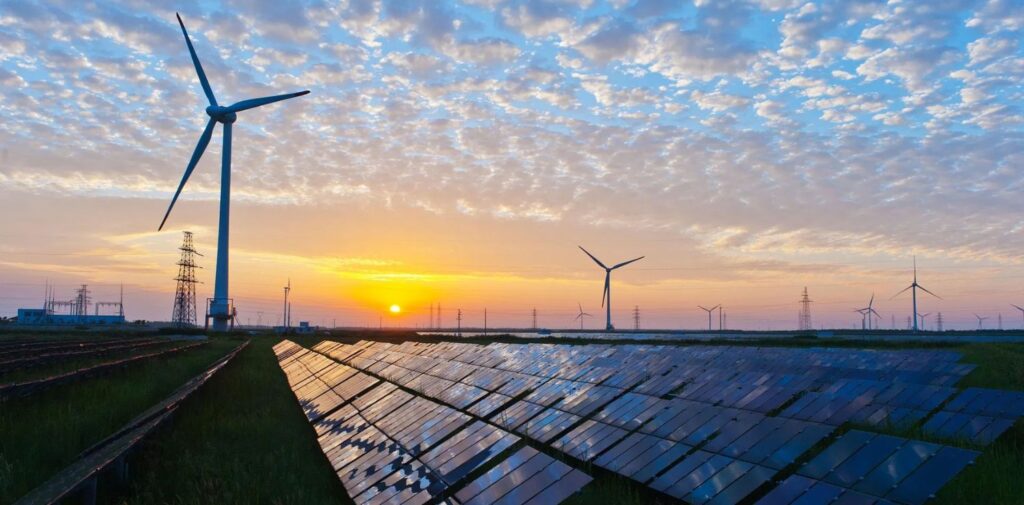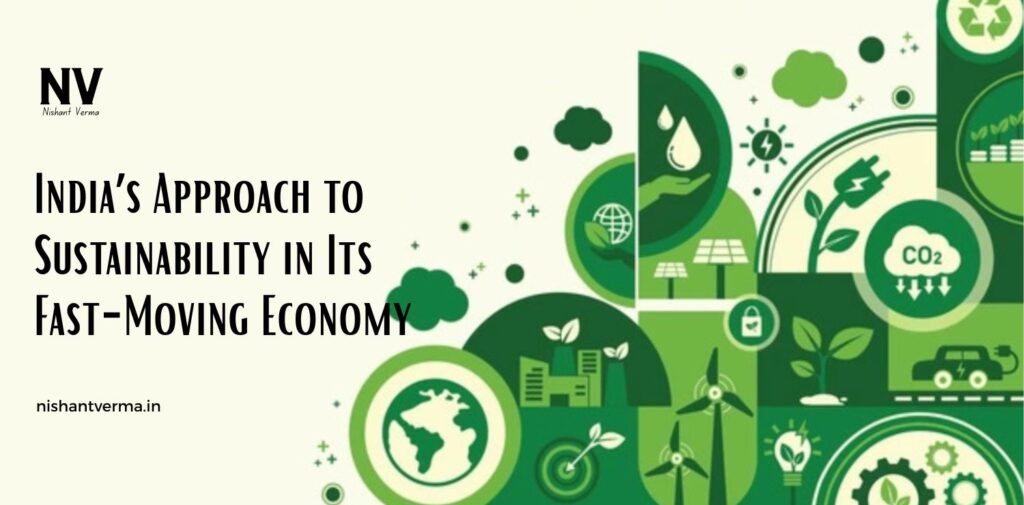India, with its rapidly growing economy and burgeoning population, is at a crossroads. As the country accelerates its economic growth, it faces the pressing challenge of ensuring that development is sustainable. Sustainability isn’t just a buzzword for India anymore; it is becoming a critical part of the country’s economic policies and strategies. In this article, we will look at how India is integrating sustainability into its fast-moving economy, focusing on the key areas such as renewable energy, green technologies, sustainable agriculture, and policy initiatives that aim to balance growth with environmental preservation.
The Need for Sustainable Development in India’s Growing Economy
India, as one of the largest and fastest-growing economies in the world, has seen unprecedented economic growth over the past few decades. However, this growth has come with challenges like rising pollution levels, depleting natural resources, and increasing carbon emissions. As the world grapples with the effects of climate change, India has realized the importance of adopting sustainable practices across all sectors of the economy.
The country’s population, which is expected to reach 1.6 billion by 2050, is placing immense pressure on resources like water, energy, and land. Moreover, as millions of people continue to move from rural areas to urban centers, the demand for housing, transport, and infrastructure is on the rise. Therefore, India must find ways to promote economic growth while preserving its environment for future generations. This balance between economic progress and environmental protection is where sustainability plays a crucial role.

Renewable Energy: India’s Commitment to Clean Power
One of the most significant steps India is taking towards sustainability is its commitment to renewable energy. The country has set ambitious goals to transition from fossil fuels to cleaner sources of energy like solar, wind, and hydro power. India has become one of the leading nations in solar energy production, with the government launching the “National Solar Mission” as part of its efforts to harness the country’s abundant sunlight.
India’s renewable energy capacity has grown exponentially in recent years, and the country is now one of the world’s largest producers of solar energy. The government has also made significant investments in wind power, aiming to expand its wind energy capacity to 60 GW by 2030. Additionally, India is focusing on improving energy storage solutions to ensure that renewable energy can be effectively harnessed and used at all times.
By 2030, India has set a target of generating 50% of its energy from non-fossil fuel sources. This transition to renewable energy will not only reduce carbon emissions but will also create jobs, improve energy security, and make the economy more resilient to global energy price fluctuations. India’s investment in green energy is a clear signal that the country is taking sustainability seriously and is committed to reducing its carbon footprint while supporting economic growth.
Green Technologies: Innovation for a Sustainable Future
Another critical area where India is focusing on sustainability is green technologies. These technologies aim to reduce environmental impact while improving efficiency and productivity across industries. India is actively encouraging innovation in sectors like waste management, electric mobility, water conservation, and energy efficiency through various government schemes and incentives.
Electric vehicles (EVs) are one of the most promising green technologies that India is promoting. With pollution levels in many cities reaching alarming levels, the government is keen on transitioning to electric mobility to reduce harmful emissions. The government has launched the Faster Adoption and Manufacturing of Hybrid and Electric Vehicles (FAME) scheme to support the growth of the EV market by providing incentives for electric car manufacturers and buyers.
Moreover, India is investing in waste-to-energy technologies that can convert waste into valuable energy sources. This not only helps in managing the country’s growing waste problem but also generates renewable energy, further reducing the reliance on fossil fuels. Smart technologies like IoT (Internet of Things) and AI are also being applied to improve energy efficiency in industries, buildings, and homes, ensuring that resources are used optimally.
Incorporating green technologies into India’s industries is a vital step toward achieving long-term sustainability. These technologies enable businesses to reduce their environmental impact while simultaneously driving innovation and economic growth.

Sustainable Agriculture: Securing the Future of Indian Farming
Agriculture has been the foundation of India’s economy for centuries, but it is also one of the sectors most vulnerable to environmental challenges such as water scarcity, soil degradation, and climate change. As the demand for food continues to rise with India’s growing population, it is crucial that India adopts sustainable agricultural practices to ensure food security without compromising the environment.
Sustainable farming practices like organic farming, agroforestry, and water-efficient irrigation systems are gaining momentum in India. The government has been promoting the use of organic fertilizers, crop rotation, and the reduction of chemical pesticides through schemes like the National Mission on Sustainable Agriculture (NMSA). These initiatives aim to improve soil health, increase biodiversity, and ensure that farming practices are environmentally friendly.
Moreover, the use of technology in agriculture is helping farmers make more sustainable decisions. Precision farming, which involves using GPS and sensor technology to monitor soil health and manage water and nutrients more efficiently, is becoming more widespread. This approach reduces the need for excessive use of chemicals and water, leading to higher productivity with a smaller environmental footprint.
With climate change threatening the agricultural sector, sustainable practices are becoming even more critical. By adopting green technologies and eco-friendly practices, India’s agriculture can continue to thrive while ensuring the well-being of future generations.
Policy Support and Government Initiatives for Sustainability
For sustainability to be successfully integrated into India’s fast-growing economy, strong policy support and government initiatives are essential. The Indian government has taken significant steps to promote sustainable development across various sectors. Policies like the “National Action Plan on Climate Change” and the “Swachh Bharat Abhiyan” (Clean India Campaign) reflect India’s commitment to sustainability.
The government has also introduced several financial and regulatory measures to encourage businesses and individuals to adopt sustainable practices. These include subsidies and incentives for renewable energy projects, tax breaks for electric vehicle purchases, and financial assistance for sustainable farming initiatives. In addition, the government has been actively working to promote the adoption of circular economy principles, which involve reducing waste and reusing resources rather than relying on the linear model of extraction, use, and disposal.
India has also been an active participant in global environmental initiatives like the Paris Agreement. The country has committed to reducing its carbon emissions intensity by 33-35% by 2030, compared to 2005 levels. This international commitment underscores India’s recognition of the global importance of sustainability and climate action.

The Challenges India Faces in Achieving Sustainability
While India has made considerable progress in adopting sustainable practices, challenges remain. The country’s rapid urbanization, industrial growth, and population increase continue to put significant pressure on its natural resources. Pollution levels in many Indian cities are among the highest in the world, and managing waste and water resources remains an ongoing issue.
Moreover, the transition to renewable energy and green technologies requires substantial investment and infrastructure development. While India has made great strides in solar and wind energy, more work needs to be done to create the infrastructure necessary to support a larger share of renewable energy in the grid.
Additionally, there is a need to raise awareness about the importance of sustainability and encourage individuals, businesses, and communities to adopt eco-friendly practices. Education and outreach programs are crucial in helping people understand the long-term benefits of sustainability.
Conclusion: India Approach to Sustainability
India approach to sustainability in its fast-moving economy is a balancing act. On one hand, the country needs to continue growing economically to meet the needs of its vast population and global aspirations. On the other hand, it must ensure that this growth does not come at the expense of its environment and future generations.
Through strategic investments in renewable energy, green technologies, and sustainable agriculture, India is building a foundation for a more sustainable future. With the right policies, innovation, and commitment from both the government and the private sector, India can successfully navigate the path to sustainable growth, ensuring a healthier and more prosperous future for all.




